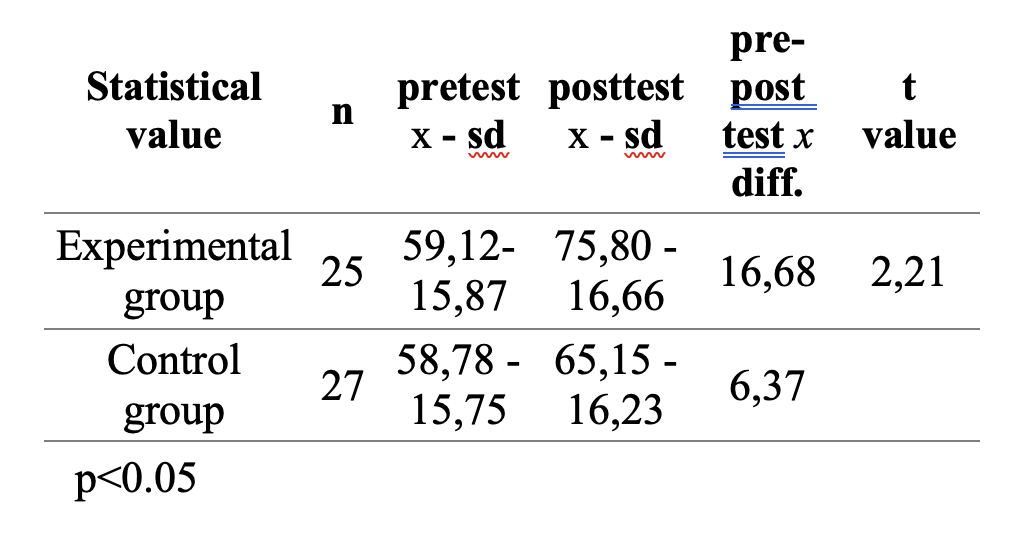Effect of flipped classroom models with creative game activities on pupils' mathematics achievement
DOI:
https://doi.org/10.31629/jg.v10i1.7252Keywords:
flipped classroom model, mathematics achievement, creative gameAbstract
This study examined the effect of the flipped classroom model and creative mathematics activities and games on mathematics achievement. Two equivalent 4th-grade students from a public school in Kırıkkale, Turkey, were randomly selected to create experimental and control groups. The experimental group consisted of 25 students, while the control group consisted of 27 students. Before the application, a mathematics achievement test prepared by the curriculum was applied to both groups, while Mathematics game videos following the curriculum were ready for the experimental group. Then, application studies were carried out with the experimental group for 4 weeks. Meanwhile, no intervention was made in the control group, and their traditional teaching continued. At the end of 4 weeks, the mathematics achievement test was re-administered to both groups, and the results were compared. While the difference between the experimental group's pre- and posttest mean scores is 16,68, the difference between the control group's pre and posttest mean scores is 6,37. As a result, it was concluded that creative games and activities combined with the flipped classroom model increased mathematics achievement. The study recommended designing creative activities with the flipped classroom model to increase success in other courses, such as mathematics.
Downloads
References
Almulla, M. A. (2020). The effectiveness of the project-based learning (PBL) approach as a way to engage students in learning. Sage Open, 10(3), 2158244020938702.
Al-Samarraie, H., Shamsuddin, A., & Alzahrani, A. I. (2020). A flipped classroom model in higher education: a review of the evidence across disciplines. Educational Technology Research and Development, 68(3), 1017-1051.
Arnab, S., Clarke, S., & Morini, L. (2019). Co-creativity through play and game design thinking. Electronic Journal of E-Learning, 17(3), 184-198. https://doi.org/10.34190/JEL.17.3.002.
Ariyanti, N., Azizah, N. L., & Amir, M. F. (2022). Math village: Creative games as an effort to improve children’s counting ability post covid 19 pandemic. Procedia of Social Sciences and Humanities, 3, 1252-1258.
Bahiyah, N. (2023). Revolutionizing education: unlocking the potential of asynchronous video for interactive online learning. International Journal of Education and Humanities, 3(2), 187-196.
Balaaldia, M. C. T. (2022). Math creative games: An intervention material in teaching basic mathematics. IJRP: International Journal of Reseach Publication, 103(1), 856-870.
Cabı, E. (2018). The impact of the flipped classroom model on students' academic achievement. International review of research in open and distributed learning, 19(3).
Chatain, J., Bitter, O., Fayolle, V., Sumner, R. W., & Magnenat, S. (2019, October). A creative game design and programming app. In Proceedings of the 12th ACM SIGGRAPH Conference on Motion, Interaction and Games (pp.1-6). https://doi.org/10.1145/3359566.3360056.
Chen, L., Chen, T. L., & Chen, N. S. (2015). Students’ perspectives of using cooperative learning in a flipped statistics classroom. Australasian Journal of Educational Technology, 31(6).
Husna, N. A. U., Febrian, F., Risky, M., Arifin, Y. S., Hamudin, I. A., Sarah, S., ... & Wardina, F. (2023). Ethnomathematics on traditional games: Porok from Penaga Village. Jurnal Gantang, 8(2), 133-143. https://doi.org/10.31629/jg.v8i2.6653
Lazic, B., Knežević, J., & Maričić, S. (2021). The influence of project-based learning on student achievement in elementary mathematics education. South African Journal of Education, 41(3).
Lin, X., & Gao, L. (2020). Students’ sense of community and perspectives of taking synchronous and asynchronous online courses. Asian Journal of Distance Education, 15(1), 169-179.
Luo, X., Wang, F., & Luo, Z. (2009). Investigation and analysis of mathematics anxiety in middle school students. Journal of mathematics Education, 2(2), 12-19.
Meeter, M. (2021). Primary school mathematics during the COVID-19 pandemic: No evidence of learning gaps in adaptive practicing results. Trends in neuroscience and education, 25, 100163.
Mulyono, B., Kurniadi, E., Araiku, J., Otniel, O., & Ratnanenci, C. (2023). Development of Android-based statistics learning simulation media to support student achievement. Jurnal Gantang, 8(2), 145-154. https://doi.org/10.31629/jg.v8i2.6465
Mun, J. (2022). The Effect of Game Playing and Goal Orientation on Creativity. Frontiers in Psychology, 13, 899694. https://doi.org/10.3389/fpsyg.2022.899694.
Oni, L. (2018). Effect of cooperative learning strategy on students’ achievement in and attitude to Mathematics. In Harvard Conference on Preparing Students for an Uncertain Future, Boston, USA (Vol. 16, No. 1, pp. 55-66).
Petrillo, J. (2016). On flipping first-semester calculus: A case study. International Journal of Mathematical Education in Science and Technology, 47(4), 573-582.
Price, P. C., Jhangiani, R. S., & Chiang, I. C. A. (2015). Quasi–experimental research. Research methods in psychology.
Toptaş, V., Usluoğlu, B., & Şengün, G. (2021). Opinions and suggestions of classroom teachers in online mathematics education during the Covid-19 pandemic. Journal of Educational Technology and Online Learning, 4(4), 880-895.
Sulaimon, J. T., & Manditereza, B. (2024). Investigating the Effect of the Traditional Flipped Classroom in Teaching Primary 3 Class Mathematics. Journal of Education and Practice, 8(1), 1-12.
Sulaimon, J. T., Yusuf, M. O., Yakub, K. I., & Syarif, M. I. (2023). Effect of probem-solving method on pupils’academic achievement in mathematics. el-Ibtidaiy: Journal of Primary Education, 6(2), 165-175.
Ugwuanyi, C. S., Okeke, C. I., & Asomugha, C. G. (2020). Prediction of Learners' Mathematics Performance by Their Emotional Intelligence, Self-Esteem and Self-Efficacy. Cypriot Journal of Educational Sciences, 15(3), 492-501.
Unal, E., & Cakir, H. (2021). The effect of technology-supported collaborative problem-solving method on students’ achievement and engagement. Education and Information Technologies, 26(4), 4127-4150.
Usluoğlu, B., & Toptaş, V. (2023). Investigation of the effects of creative games and activities on mathematics attitudes and achievements in primary school. Elementary Mathematics Education Journal, 5(1), 65-73.

Downloads
Published
Issue
Section
License
Copyright (c) 2025 Jurnal Gantang

This work is licensed under a Creative Commons Attribution-NonCommercial-ShareAlike 4.0 International License.

















